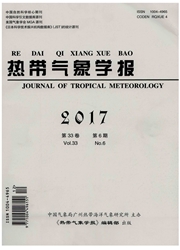

 中文摘要:
中文摘要:
用小波变换分析了1948-2003年南海夏季风强度指数序列振荡特征,并研究了Lanczos滤波器滤出的不同时间尺度上南海夏季风强度与SODA资料提供的海洋热力条件的关系。结果表明,南海夏季风强度变化存在准4年的年际变化、约9年周期的十年际变化和38年左右周期的年代际变化。年际变化最强,年代际变化最弱。不同尺度上的南海夏季风强度变化与海洋热力条件的显著相关区有很大的地域差异。南海夏季风强度的年际变化主要与近赤道地区的热带海洋变化有关,相关关系呈准2年变化。若前一年秋冬季节的赤道东印度洋、赤道西太平洋出现海温和温跃层深度正异常和赤道西印度洋、赤道中东太平洋出现海温和温跃层深度负异常时,对应于当年的年际尺度上的南海夏季风加强;反之则减弱。南海夏季风强度与后期海温的对应关系为:南海夏季风加强,秋季时,南海周边海区和澳大利亚东部海区海温显著负相关;冬季时,热带西印度洋、赤道中东太平洋和赤道大西洋海温出现显著的正相关。南海夏季风强度的年代变化受PDO的调制。年代际尺度上南海夏季风强度的变化即与全球变暖有关,也与PDO有关。
 英文摘要:
英文摘要:
The oscillation characteristics of 1948-2003 South China Sea (SCS) summer monsoon intensity (SCSSMI) is analyzed by wavelet transform and the relationship between SCSSMI filtered by Lanczos filter at different time scale and oceanic thermal conditions is studied. The results show that SCSSMI exhibits dominant interannual (about 4 years), decadal (about 9 years) and interdecadal (about 38 years) oscillation periods. The interannual variation is the strongest and the interdecadal variation the weakest. The region of significant correlation between SCS summer monsoon intensity and oceanic thermodynamic variables at different time scale is greatly different. Significant correlation area of interannual variation of SCSSMI is concentrated in near equatorial region. Corresponding correlation displays quasi-biannual variability. If positive anomalies of SST and the depth of thermocline happen in eastern equatorial Indian Ocean and western equatorial Pacific, and negative anomalies of SST and the depth of thermocline happen in western equatorial Indian Ocean and eastern equatorial Pacific in previous autumn and winter, the interannual variation of SCSSMI will enhance. If the condition is contrary, interannual variation of SCSSMI will weaken. The interannual variation of SCSSMI will influence SST. The region surrounding SCS and east of Australia shows significantly negative correlation in autumn, and significantly positive correlation exhibits in west equatorial Indian Ocean, eastern equatorial Pacific and equatorial Atlantic in winter. The decadal variation of SCSSMI is modulated by PDO. Interdecadal variation of SCSSMI is relevant to the global warming and PDO.
 同期刊论文项目
同期刊论文项目
 同项目期刊论文
同项目期刊论文
 A local positive feedback of the tropical Pacific ocean-atmosphere system on interdecadal timescales
A local positive feedback of the tropical Pacific ocean-atmosphere system on interdecadal timescales A local positive feedback of the tropical Pacific ocean-atmosphere system on interdecadal timescales
A local positive feedback of the tropical Pacific ocean-atmosphere system on interdecadal timescales The coral grayness in northern South China Sea and its description of interdecadal variation of prec
The coral grayness in northern South China Sea and its description of interdecadal variation of prec 期刊信息
期刊信息
